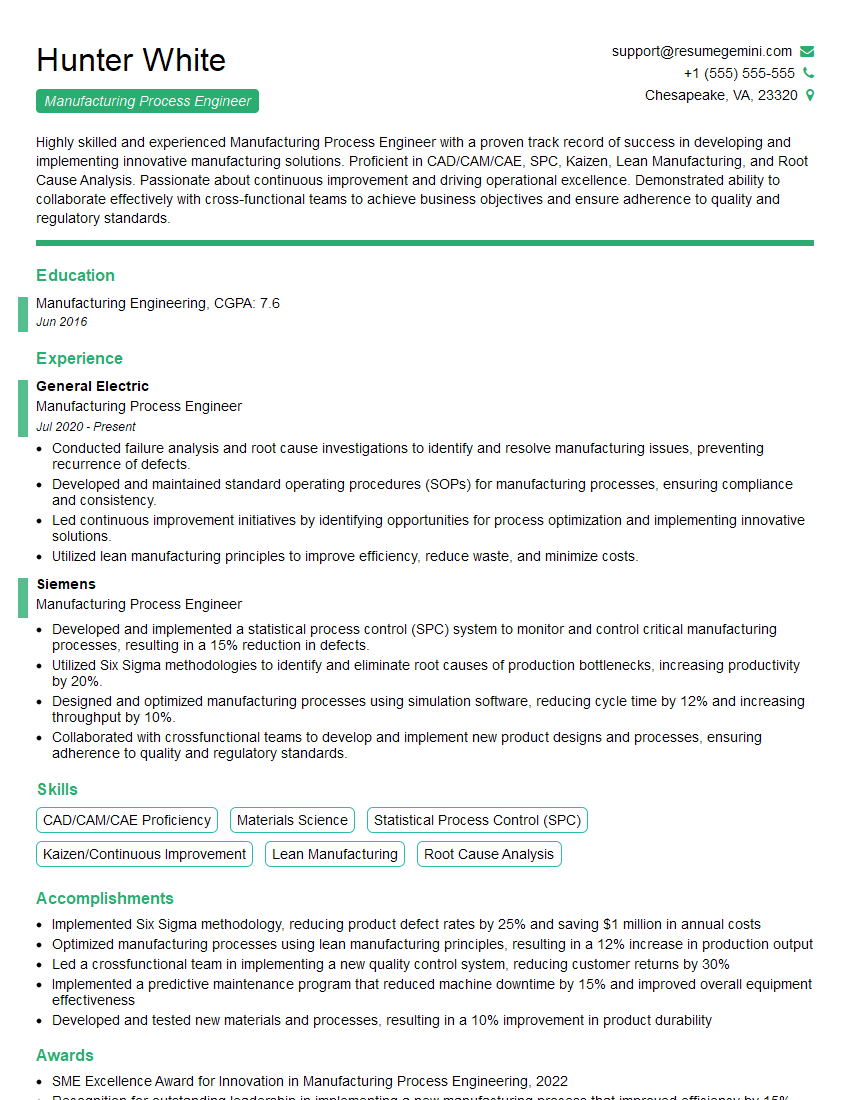Are you a seasoned Manufacturing Process Engineer seeking a new career path? Discover our professionally built Manufacturing Process Engineer Resume Template. This time-saving tool provides a solid foundation for your job search. Simply click “Edit Resume” to customize it with your unique experiences and achievements. Customize fonts and colors to match your personal style and increase your chances of landing your dream job. Explore more Resume Templates for additional options.

Hunter White
Manufacturing Process Engineer
Summary
Highly skilled and experienced Manufacturing Process Engineer with a proven track record of success in developing and implementing innovative manufacturing solutions. Proficient in CAD/CAM/CAE, SPC, Kaizen, Lean Manufacturing, and Root Cause Analysis. Passionate about continuous improvement and driving operational excellence. Demonstrated ability to collaborate effectively with cross-functional teams to achieve business objectives and ensure adherence to quality and regulatory standards.
Education
Manufacturing Engineering
June 2016
Skills
- CAD/CAM/CAE Proficiency
- Materials Science
- Statistical Process Control (SPC)
- Kaizen/Continuous Improvement
- Lean Manufacturing
- Root Cause Analysis
Work Experience
Manufacturing Process Engineer
- Conducted failure analysis and root cause investigations to identify and resolve manufacturing issues, preventing recurrence of defects.
- Developed and maintained standard operating procedures (SOPs) for manufacturing processes, ensuring compliance and consistency.
- Led continuous improvement initiatives by identifying opportunities for process optimization and implementing innovative solutions.
- Utilized lean manufacturing principles to improve efficiency, reduce waste, and minimize costs.
Manufacturing Process Engineer
- Developed and implemented a statistical process control (SPC) system to monitor and control critical manufacturing processes, resulting in a 15% reduction in defects.
- Utilized Six Sigma methodologies to identify and eliminate root causes of production bottlenecks, increasing productivity by 20%.
- Designed and optimized manufacturing processes using simulation software, reducing cycle time by 12% and increasing throughput by 10%.
- Collaborated with crossfunctional teams to develop and implement new product designs and processes, ensuring adherence to quality and regulatory standards.
Accomplishments
- Implemented Six Sigma methodology, reducing product defect rates by 25% and saving $1 million in annual costs
- Optimized manufacturing processes using lean manufacturing principles, resulting in a 12% increase in production output
- Led a crossfunctional team in implementing a new quality control system, reducing customer returns by 30%
- Implemented a predictive maintenance program that reduced machine downtime by 15% and improved overall equipment effectiveness
- Developed and tested new materials and processes, resulting in a 10% improvement in product durability
Awards
- SME Excellence Award for Innovation in Manufacturing Process Engineering, 2022
- Recognition for outstanding leadership in implementing a new manufacturing process that improved efficiency by 15%
- Awarded the Manufacturing Innovation Award for developing a novel process that reduced production time by 20%
- Recognition for exceptional contributions to the development of a new manufacturing technology that increased production capacity by 18%
Certificates
- Certified Manufacturing Engineer (CMfgE)
- Certified Six Sigma Black Belt (CSSBB)
- ASME Certified Verification Engineer
- ISO 9001 Internal Auditor
Career Expert Tips:
- Select the ideal resume template to showcase your professional experience effectively.
- Master the art of resume writing to highlight your unique qualifications and achievements.
- Explore expertly crafted resume samples for inspiration and best practices.
- Build your best resume for free this new year with ResumeGemini. Enjoy exclusive discounts on ATS optimized resume templates.
How To Write Resume For Manufacturing Process Engineer
- Highlight your proficiency in relevant software and tools, such as CAD/CAM/CAE, SPC, and Six Sigma.
- Quantify your accomplishments with specific metrics to demonstrate the impact of your work.
- Showcase your ability to work effectively in a team environment and collaborate with cross-functional stakeholders.
- Demonstrate your commitment to continuous improvement and innovation.
- Tailor your resume to each specific job application, highlighting the skills and experiences that are most relevant to the position.
Essential Experience Highlights for a Strong Manufacturing Process Engineer Resume
- Developed and implemented a statistical process control (SPC) system to monitor and control critical manufacturing processes, resulting in a 15% reduction in defects.
- Utilized Six Sigma methodologies to identify and eliminate root causes of production bottlenecks, increasing productivity by 20%.
- Designed and optimized manufacturing processes using simulation software, reducing cycle time by 12% and increasing throughput by 10%.
- Collaborated with cross-functional teams to develop and implement new product designs and processes, ensuring adherence to quality and regulatory standards.
- Conducted failure analysis and root cause investigations to identify and resolve manufacturing issues, preventing recurrence of defects.
- Developed and maintained standard operating procedures (SOPs) for manufacturing processes, ensuring compliance and consistency.
- Led continuous improvement initiatives by identifying opportunities for process optimization and implementing innovative solutions.
- Utilized lean manufacturing principles to improve efficiency, reduce waste, and minimize costs.
Frequently Asked Questions (FAQ’s) For Manufacturing Process Engineer
What are the key skills required for a Manufacturing Process Engineer?
Key skills for a Manufacturing Process Engineer include CAD/CAM/CAE proficiency, materials science, statistical process control (SPC), Kaizen/continuous improvement, lean manufacturing, and root cause analysis.
What are the typical responsibilities of a Manufacturing Process Engineer?
Manufacturing Process Engineers are responsible for developing and implementing manufacturing processes, optimizing production efficiency, conducting failure analysis, developing and maintaining SOPs, and leading continuous improvement initiatives.
What industries hire Manufacturing Process Engineers?
Manufacturing Process Engineers are employed in various industries, including automotive, aerospace, medical devices, electronics, and consumer products.
What is the career path for a Manufacturing Process Engineer?
Manufacturing Process Engineers can advance to roles such as Manufacturing Manager, Production Manager, or Quality Manager.
What are the challenges faced by Manufacturing Process Engineers?
Challenges faced by Manufacturing Process Engineers include managing complex production processes, optimizing production efficiency, and ensuring adherence to quality and regulatory standards.
What are the latest trends in Manufacturing Process Engineering?
Recent trends in Manufacturing Process Engineering include the adoption of Industry 4.0 technologies, such as IoT, automation, and data analytics, as well as a focus on sustainable manufacturing practices.